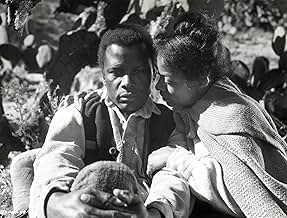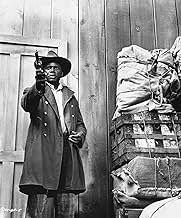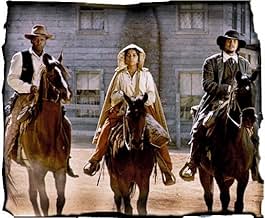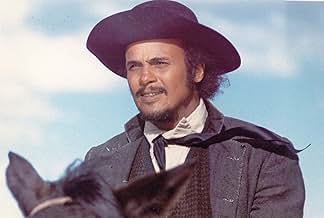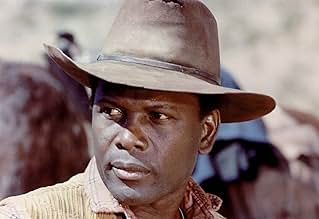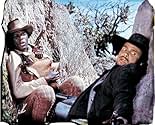PUNTUACIÓN EN IMDb
6,6/10
3 mil
TU PUNTUACIÓN
Un maestro en carretas y un predicador estafador ayudan a liberar esclavos que son perseguidos por un grupo de agentes de mano de obra barata del oeste.Un maestro en carretas y un predicador estafador ayudan a liberar esclavos que son perseguidos por un grupo de agentes de mano de obra barata del oeste.Un maestro en carretas y un predicador estafador ayudan a liberar esclavos que son perseguidos por un grupo de agentes de mano de obra barata del oeste.
- Dirección
- Guión
- Reparto principal
Kenneth Menard
- Little Henry
- (as Ken Menard)
Reseñas destacadas
I don't understand how someone could classify this film as a "comedy". It did have it's comedic moments, but no more than any other Western or Drama. Then that false comment ends up on the front page of the IMDb? Weird. This was a first rate Western by any standard. At a time when Hollywood had no interest in making such films. Blaxploitation films and comedies were the rules of the day. Poitier makes a great cowboy and fine director here. I suspect the reason this film is/was not more popular is that there were so few good guys of the White persuasion. The one fair and honest White man was the town Sheriff, who was quickly killed off by another White man for this very reason.
Poitier plays Buck, one of few blacks who are qualified to be wagonmasters. It is after the Civil War and he is helping escort former slaves into the west. This is not an easy task. They face nature, bounty hunters, racist settlers, robbers, and Indians. The movie is brutally honest with the hatred that these brave men and women faced, but the film has a strong sense of hope. They are not quitters, they raise money workers for sharecroppers along the way. Harry Belafonte has the most colorful role as The Preacher - a reformed thief who befriends Buck when given no one else to trust. The movie is bleak, yet hopeful, well-acted, and exciting. It deserves to be remembered with the best of westerns from that era. Much more historical importance than its predecessor, "Butch Cassidy and the Sundance Kid" with its sappy, happiness and handsome boy wonders. And Poitier rivals George Roy Hill as a director any day. Cool folksy-jazz score. Recommended to anyone who enjoys a fresh, historical angle with their westerns.
I just saw this movie for the first time on Turner Classic Movies tonight. I had heard about it, but missed it. It's just another shoot-'em-up horse opera, but this time with a difference. It's one of the only westerns ever made that is a story about black people in the Old West, with black actors in the lead roles. Harry Belafonte is excellent as the Preacher. Sidney Poitier is also very good, and although the story contains the full compliment of standard cowboy movie clichés---shoot-outs, posse chases, bank robberies, whining ricochet sounds, etc.---, it's very entertaining. The vast majority of Hollywood westerns are exclusively white, and feature virtually no black people at all. Indians are almost always featured as pidgin-speaking cigar-store cartoon characters, with white actors usually in the speaking parts. Some idiot composer came up with the pounding tom-toms, descending minor theme music played by trombones and low brass whenever Indians come into the picture. It's unbelievable how ridiculous this music is. Hollywood has a lot to answer for in its racist treatment of minorities throughout its early history, which has never been fully addressed. So it's great to see a western like Buck and The Preacher that is different. As a result, it's a lot better than your average western, even though it milks the same old clichés.
It regards a trail guide and a con preacher join forces to help a wagon train of former slaves who are escaping from cutthroats and seeking to homestead out the West . The civil war was over and by law the slaves were freed . But when the promise of land and freedom was not honored , many ex-slaves journeyed out of the land of bondage in search of new frontiers where they could be free at last . They placed their hopes in the hands of the few black wagonmasters that knew the territories of the west . None of this came easy , for not only did they have to overcome hostile wilderness , but nightriders and bounty hunters were hired by persons unknown to hunt them down and turn them back to the Southern fields . This picture is dedicated to those men , women and children who lie in graves as unmarked as their place in history . This movie deals with a hard , long travel throughout the wilderness of a group of negroes and slaves freed after the end Civil War , being led by an intrepid wagonmaster (Sidney Poitier) along with a roguish preacher (showy acting by Harry Belafonte) wielding a peculiar Holy Bible . And being harassed by marauding white nightriders (led by Cameron Mitchell) all the way down .
Sidney Poitier performed and shot this picture , delivering it all the traditional ingredients of amusement : Riding pursuits , spectacular battles , croosfire , bank assaults , ambushes , fights with Indians , and many other things . While at the same time inserting a thought-provoking issue of accusatory coment on the ill-treatment of the ancient slaves whose graves are as unmarked as their place place in history . It has an interesting subject which is rather reminiscent of John Ford's Wagonmaster played by Ben Johnson in similar role to Poitier . Nice , though , the idea of having Indians riding and coming to rescue of the wagon train besieged by bandits , it is a gem , instead of the ordinary Union cavalry . Harry Belafonte steals the show giving an overacting and Poitier the player seems content to stand back and let the limelight falls on Harry . It is agreeable , enjoyable , and pleasant enough , but somewhat it never quite clicks , despite awesome interpretations from Belafonte and Poitier . Ruby Dee also provides a decent playing , she interprets the attractive spouse of Sidney .
The motion picture was professionally directed by Sidney Poitier . Being his fiilm debut that he took over the job from Joseph Sargent who left the filmmaking . Poitier is a fine actor and filmmaker . Poitier's talent, conscience, integrity, and inherent likability placed him on equal footing with the white stars of the day. He took on directing and producing chores in the Seventies, achieving success in both arenas . Sidney directed a few pictures , and most of them were comedies . As Poitier made : Ghost dad , Fast forward , Hanky panky , Stir Crazy , Piece of action , Let's do again , Uptown Saturday night , and this Buck and the preacher . Rating : 6/10 , passable and aceptable Western movie
Sidney Poitier performed and shot this picture , delivering it all the traditional ingredients of amusement : Riding pursuits , spectacular battles , croosfire , bank assaults , ambushes , fights with Indians , and many other things . While at the same time inserting a thought-provoking issue of accusatory coment on the ill-treatment of the ancient slaves whose graves are as unmarked as their place place in history . It has an interesting subject which is rather reminiscent of John Ford's Wagonmaster played by Ben Johnson in similar role to Poitier . Nice , though , the idea of having Indians riding and coming to rescue of the wagon train besieged by bandits , it is a gem , instead of the ordinary Union cavalry . Harry Belafonte steals the show giving an overacting and Poitier the player seems content to stand back and let the limelight falls on Harry . It is agreeable , enjoyable , and pleasant enough , but somewhat it never quite clicks , despite awesome interpretations from Belafonte and Poitier . Ruby Dee also provides a decent playing , she interprets the attractive spouse of Sidney .
The motion picture was professionally directed by Sidney Poitier . Being his fiilm debut that he took over the job from Joseph Sargent who left the filmmaking . Poitier is a fine actor and filmmaker . Poitier's talent, conscience, integrity, and inherent likability placed him on equal footing with the white stars of the day. He took on directing and producing chores in the Seventies, achieving success in both arenas . Sidney directed a few pictures , and most of them were comedies . As Poitier made : Ghost dad , Fast forward , Hanky panky , Stir Crazy , Piece of action , Let's do again , Uptown Saturday night , and this Buck and the preacher . Rating : 6/10 , passable and aceptable Western movie
We tend to forget that in 1972, in the heart of the whole "blaxploitation" movement, that the very idea of casting African-Americans in traditional white roles was daring in and of itself. As such, Buck and the Preacher, starring Sidney Poitier (who also directed) and Harry Belafonte in the titular roles must have created quite a stir upon its release. The story is pretty standard for a western--a wagon train heading west, led by a tough-as-nails trail guide, is harassed by outside forces (usually bandits or American Indians), but in this case, the settlers are all freed slaves, and the "outside forces" are hired guns by the south, bend on stopping every black settler group, destroying their supplies (and murdering a few of their people), thus terrorizing them into returning to the plantations. Former military sergeant Buck (Poitier) will have none of that, and the slick-talking con man "Preacher (Belafonte), whose initial intentions may seem questionable, mans up and does the right thing, joining forces with Buck for a typical final showdown. A fun western, to be sure, but if you're looking for deeper social commentary that what has already been described, you won't find it. A traditional western with an African-American cast is daring as it gets in 1972, but don't let that keep you away. The original score by Benny Carter, heavy on the mouth harp and that weird pig-sounding instrument they use on Green Acres, will annoy the hell out of you yet stay with you for days.
¿Sabías que...?
- CuriosidadesOn the advice of his future wife Joanna Shimkus, Sidney Poitier took over directorial duties from Joseph Sargent when he became dissatisfied with the film's point of view. As a result, this turned out to be Poitier's debut behind the camera and he would go on to direct eight more pictures.
- PifiasWhen Ruth blows out the flame in the lantern, there is a slight delay before the light goes out in the cabin and then another slight delay before the "moonlight" comes up.
- Citas
Buck: Which way are you ridin', Preacher?
The Preacher: Well, that's not exactly settled in my mind yet.
Buck: Well, you got three possibilities.
The Preacher: Oh?
Buck: North, south or east.
The Preacher: What happened to west?
Buck: We're going west.
- Créditos adicionalesOpening credits prologue: The Civil War was over and by law the slaves were freed. But when the promise of land and freedom was not honored, many ex-slaves journeyed out of the land of bondage in search of new frontiers where they could be free at last.
They placed their hopes in the hands of the few black wagonmasters that knew the territories of the West.
None of this came easy, for for not only did they have to overcome a hostile wilderness, but nightriders and bounty hunters were hired by persons unknown to hunt them down and turn them back to the fields.
This picture is dedicated to those men, women and children who lie in graves as unmarked as their place in history.
- ConexionesFeatured in The Dick Cavett Show: Episodio fechado 1 mayo 1972 (1972)
Selecciones populares
Inicia sesión para calificar y añadir a tu lista para recibir recomendaciones personalizadas
- How long is Buck and the Preacher?Con tecnología de Alexa
Detalles
- Fecha de lanzamiento
- País de origen
- Idioma
- Títulos en diferentes países
- Buck and the Preacher
- Localizaciones del rodaje
- Empresas productoras
- Ver más compañías en los créditos en IMDbPro
Taquilla
- Presupuesto
- 2.000.000 US$ (estimación)
- Recaudación en todo el mundo
- 2762 US$
Contribuir a esta página
Sugerir un cambio o añadir el contenido que falta

Principal laguna de datos
By what name was Buck y el farsante (1972) officially released in India in English?
Responde

